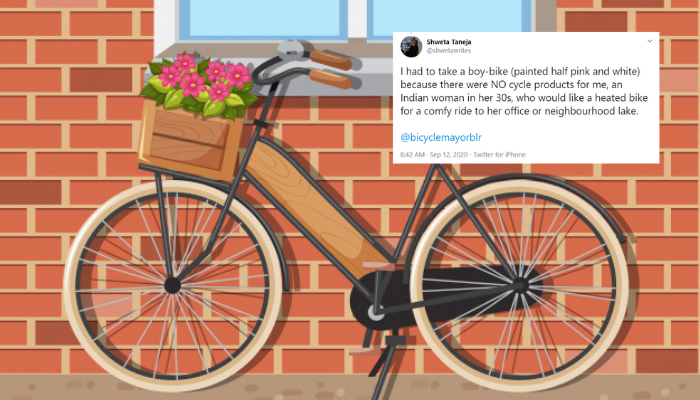Written By: Shweta Taneja
Context: Our experiences of living, using and navigating built indoor and outdoor spaces, are largely by professionals who design them for us. A lot of these experiences are gendered and marked by other factors like age, ability, and more.
In Kathryn Anthony’s 2017 book, Defined By Design, (as is described), a female, white, 61-year-old weighing 200 lbs with a height of 4’11”, said the following as she went to purchase a car:
“If women were designing cars they would be better for other women. Because women know what women want. Men don’t. Whenever I go to buy a car, the first thing I say to the salesperson is, ‘This car better fit me. Because if it doesn’t I’m not going to buy it.’”
In this Twitter thread, journalist and author Shweta Taneja shares her experiences of buying and using products that would’ve turned out differently, if the designs were more thoughtful and inclusive.
Originally posted on Twitter here, edited and reproduced with permission.
Indian businesses are seriously gendered in their product designs. Everything from furniture to cycles are made for boys and men and women and girls have to adjust.
Office Furniture
People looking for new business ideas in India, please think about office furniture for Indian women (with an average height of 5.3 feet – I’m a hopeful 5.0 feet). The chairs are too deep, the back ergonomically rubbish for short people and the tables are too high. My elbows hurt.
Ironically only IKEA has a table that fits my needs in terms of height. Even a researcher friend (height 5.4ft) didn’t like any office tables on offer. Too high. I did mention this over email to Featherlite India but there was no acknowledgement of my feedback. Ignored, of course.
Then there is the office chair’s height. My feet dangle off the seat. I’ve to keep a stool to make sure the balls of my feet touch the ground (true for other women friends). It’s too deep. The back pokes me wrong as the head is too high for my frame (again true for others).
Bicycles For Women
Don’t even get me started on cycles for Indian women. I scrounged cycle shops in Bangalore for a cycle for me – height 5.0 feet. All designs are racy and meant for boys/men. They’re also meant for fast uneasy rides, and they’re better suited for taller people.
The same bicycles are available for women in the same design but in bright pink. I found exactly three bicycles. The frame from Firefox was too big for my body. Also, it was an ugly bright pink (shudders). All ergonomically-nice bikes for women were from BSA and Atlas (frame too big and without gear) – because why would girls need speed and gears and expensive bikes?
I had to take a boy-bike (painted half pink and white) because there were NO cycle products for me, an Indian woman in her 30s, who would like a bike for a comfy ride to her office or neighbourhood lake.
Clothes For Indian Women?
That reminds me, you would think that clothes are that one thing Indian companies get right when it comes to Indian women. That happens only for some Indian punjabi suits/sarees. No sportswear fits me. T-shirts are too long (they bunch up on my rounded hips).
Even most brands make kurtis shaped for Western women (taller frame, more angular bodies). Yes I’m talking about #MadeInIndia for Indian women. Clothes don’t fit us!!
And commodes! https://t.co/A4DgMRh4HX
— Shweta Taneja (@shwetawrites) September 12, 2020
Sanitary Napkins
Gendered assumptions is another thing which pervades Indian products. Why do my sanitary napkins have to smell sickly sweet and come in pink packaging? Do the people who make this product know that my smell senses are way STRONG during periods and I gag at the fake floral smells?
Everything made for women is too feminine. That’s another type of gender stereotype of designers who don’t know how to make products for diversity. Most product designs are too pink for my taste or too sweet smelling or too curvaceous. Even sanitary napkins. Ugh.
About the author: Shweta is a journalist and a fantasy and science fiction author. Her short story, The Daughter That Bleeds has been shortlisted for the prestigious Grand Prix de l’Imaginaire 2020. You can read more about her – here.
Ungender Insights is the product of our learning from advisory work at Ungender. Our team specializes in advising workplaces on workplace diversity and inclusion. Write to us at contact@ungender.in to understand how we can partner with your organization to build a more inclusive workplace.










